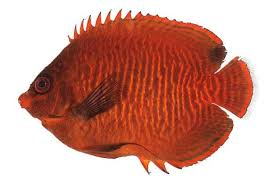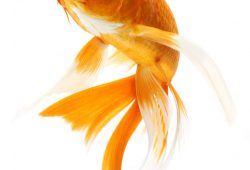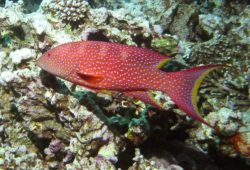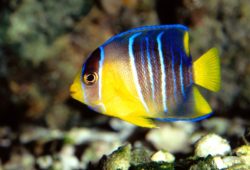Golden Angelfish
The article gives a detailed analysis of Golden Angelfish. While it is tempting to generalize about groups of fishes, such generalizations can often lead to problems. Such is the case with a few species of Dwarf Angelfishes.

The word on the street about Dwarf Angelfishes is that they are fantastic fishes appropriate for everyone from beginner to expert aquarists. While this is generally true, and there are many Dwarf Angelfishes that make excellent aquarium specimens, there are a few that should only be kept by the most experienced aquarist. This article looks at one such Dwarf Angelfish—Centropyge aurantia—with the very strong recommendation of “Buyer Beware.”
Contents
The Golden Angelfish
Centropyge aurantia is a beautiful fish. Commonly called the Golden Angelfish, it is a relatively small angel seldom growing to more than four inches in the home aquarium. There was a time when very few of these fish made it into the aquarium trade, but their intrinsic beauty drove demand, and now they are relatively common in terms of availability. An individual can usually be obtained for anywhere form $100 to $150 depending on the size. Unfortunately, Golden Angelfish are often lumped in with the majority of Dwarf Angelfishes and assumed to be hardy aquarium specimens. It is often too late when the aquarist realizes that he or she is in over his or her head with this too often difficult-to-keep species.
Family Pomacanthidae
First a little background. The Golden Angelfish is a member of the genus Centropyge, otherwise known as the Dwarf or Pygmy Angelfishes. These are undoubtedly the most popular angelfishes in the hobby given their general hardiness, small size and fantastic appearance. All marine angelfishes belong to the family Pomacanthidae from the taxonomical class Actinopterygii (ray-finned fishes). There are about 74 species of angelfishes in at least nine genera. They are endemic to the Tropical Atlantic Ocean and the Indo-Pacific. As you can see, this is a fairly diverse family of fishes, and, as a result, generalizations are best avoided.
Why This Fish Can be Hard to Keep
The Golden Angelfish is a tropical, reef angelfish that inhabits seaward reef-slopes down to depths of more than 180 feet. They can be found throughout the western Pacific from the northern Great Barrier Reef to Samoa and Indonesia. It is, in part, this fish’s preferred depth, however, that makes it difficult to keep in the aquarium—especially in a reef tank with high intensity lighting that replicates a much shallower environment than the one to which the individual may be accustomed. Problem number one—this fish usually requires a lengthy and somewhat tedious lighting acclimatization that many photosynthetic corals cannot survive and many beginning aquarists fail to realize is necessary.
Contributing to the difficulty of keeping the Golden Angelfish in a home aquarium is the fact that, unlike most Dwarf Angelfishes, the Golden Angelfish is somewhat shy and may not defend itself against more aggressive fishes. This is why it is essential to keep this species as the only angelfish in an aquarium unless the aquarium is very large (300 gallons plus). This is not the case with many other dwarf angelfishes that can often be kept with other species from the same genera if they are provided with sufficient room and multiple hiding spots. This leads to problem number two—the Golden Angelfish needs peaceful tankmates, unlike most other Dwarf Angelfishes that do fine with larger, more aggressive tankmates (even from the same genus).
Be a Contentious Marine Aquarist
There are several other reasons that the Golden Angelfish does not do well in the home aquarium, but the point of this article is to understand that it is almost always a bad idea to generalize about a group of fishes. Yes, it is true that most Dwarf Angelfishes are small, yet hardy and colorful fishes appropriate for the beginning aquarist, but there are some Dwarf Angelfishes best left to the experts. Do your homework before purchasing any fish—that is your responsibility, as Bob Fenner would say, as a contentious marine aquarist.



